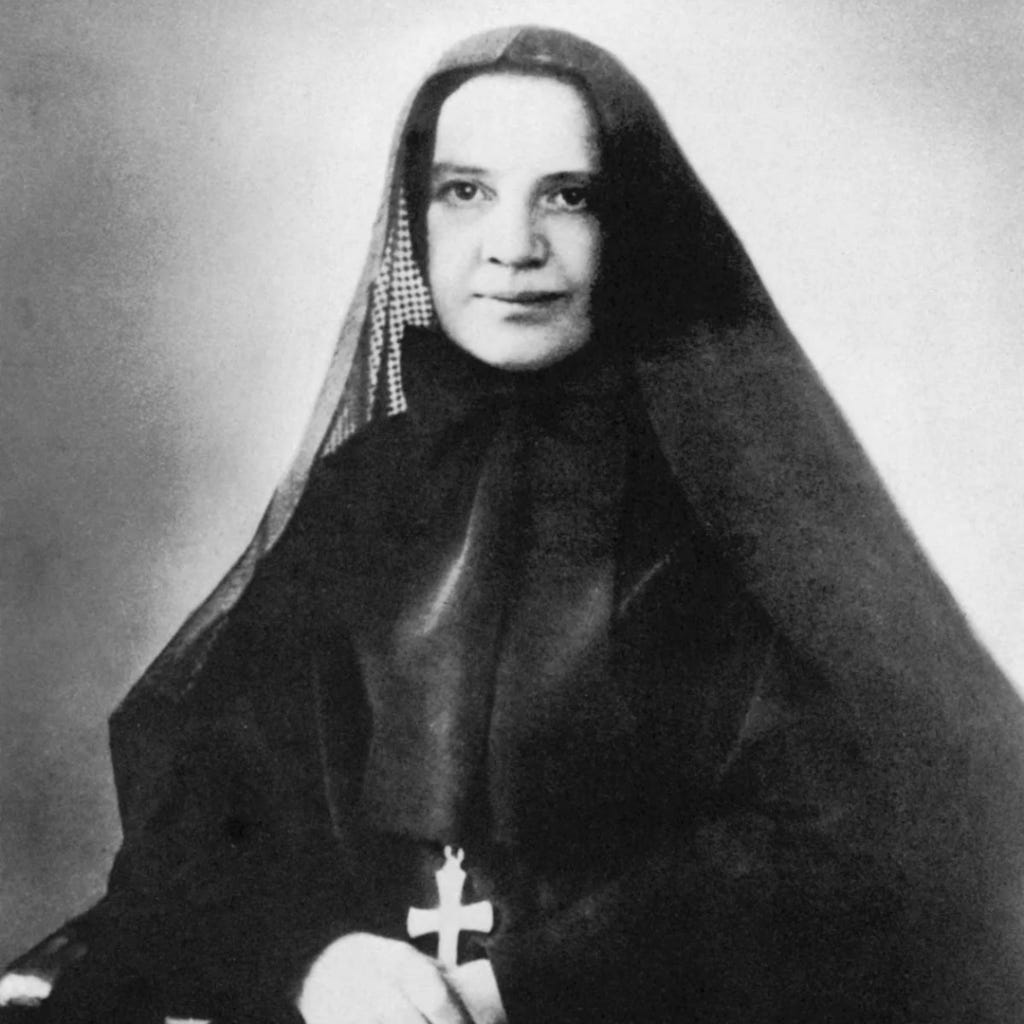Today is the Feast Day of Saint Frances Xavier Cabrini
A life of Mercy Through Union with Christ
Spiritual writers often remind us of a truth we see reflected again and again in the lives of the saints: that a life of active charity can only be sustained by deep union with God. Holiness is not a result of sheer effort or goodwill alone. It flows from a heart rooted in contemplation, in a relationship with Christ that nourishes every outward act.
Think of St. Catherine of Siena, St. Teresa of Avila, or St. Dominic. These and countless other saints were men and women whose lives reveal this inseparable bond between prayer and action. They didn’t withdraw from the world to become holy; rather, their communion with God sent them out into the world with generous hearts.
Today, on the feast of St. Frances Xavier Cabrini, we’re given another powerful witness of this interior union bearing fruit in mercy.
Like the saints before her, Mother Cabrini lived her life entirely for Jesus, and because of this, she gave her whole self to others. She clothed the poor, fed the hungry, visited the sick, welcomed immigrants, taught the faith, and comforted those in prison. She didn’t simply serve needs, but she dignified people. She didn’t perform works of mercy as a task list but as a way of life rooted in love.
What often surprises me is how physically fragile she appears in photos. She is delicate, almost breakable. And yet, when you read about what she accomplished, it’s astonishing. Humanly speaking, it doesn’t add up. But that’s the beauty of grace. Her strength didn’t come from her body but from her interior life that was united with Christ, filled with His strength. In her weakness, He truly was strong (cf. 2 Cor 12:9).
The Catechism teaches:
The works of mercy are charitable actions by which we come to the aid of our neighbor in his spiritual and bodily necessities. Instructing, advising, consoling, comforting are spiritual works of mercy, as are forgiving and bearing wrongs patiently. The corporal works of mercy consist especially in feeding the hungry, sheltering the homeless, clothing the naked, visiting the sick and imprisoned, and burying the dead. Among all these, giving alms to the poor is one of the chief witnesses to fraternal charity: it is also a work of justice pleasing to God. (CCC 2447).
And Christ’s own words call us clearly:
“He who has two coats, let him share with him who has none; and he who has food, let him do likewise” (Lk 3:11).
This is the path Mother Cabrini walked in what Pope Pius XII called a life in which “nothing, aided by God’s grace, seemed too laborious, or difficult, or beyond human strength.” She lived the virtue of magnanimity, a greatness of soul that does not arise from ambition but from surrender.
She gave her life tirelessly, but it was never self-reliance. It was Jesus in her who loved, healed, welcomed, and served. And this is what gives us hope. Because what He did in her, He can do in us, if we let Him.
Today, let her witness prompt the right questions:
What work of mercy is mine to do today?
Who has God placed at the edge of my life, needing shelter, comfort, or kindness?
Where is Christ waiting for me—in the poor, the sick, the weary, the overlooked?
St. Frances Xavier Cabrini didn’t live a life of noise or spectacle. She lived one of daily fidelity. Her yes was quiet, but constant. And through it, God moved mountains.
On her feast day, let us not only admire her legacy, but let us ask for her intercession, and take up her way.
© 2025, Lawain McNeil, Mission Surrender, LLC.




Lord, help me to be more merciful, more caring, more lovable in all my ways. Great message to ‘take heart’ in..Thanks for posting, Lawain..